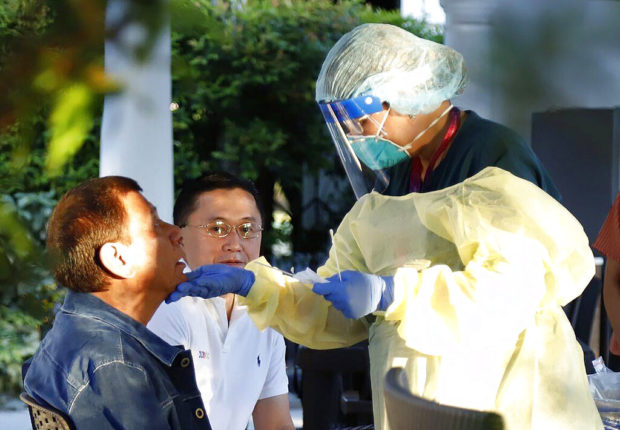Duterte: Gov’t work in executive branch suspended due to COVID-19

In this photo provided by the Office of Senator Bong Go, President Rodrigo Duterte undergoes testing for COVID-19 at the Malacanang. Palace officials say Duterte is being tested for the new virus after meeting with Cabinet officials who were exposed to infected people. For most people, the new coronavirus causes only mild or moderate symptoms. For some it can cause more severe illness. (Office of Senator Bong Go via AP)
MANILA, Philippines — President Rodrigo Duterte has announced the suspension of government work in the executive branch in a bid to contain the spread of the coronavirus disease (COVID-19) in the country.
The suspension will be in effect for a month or exactly until April 12, 2020 “without prejudice to the formation of skeletal workforces by government agencies.”
The suspension work came in light of the expansion of the COVID-19 alert from Code Red Sublevel 1 to Sublevel 2.
The legislative and judiciary, meanwhile, are encouraged to adopt the same policy.
Law enforcement agencies, including the Armed Forces of the Philippines and the Philippine National Police, as well as health and emergency frontline services will continue in full operation.
Article continues after this advertisement“Flexible work arrangements shall likewise be encouraged in the private sector,” Duterte said in his public address on COVID-19 Thursday night.
Article continues after this advertisementThe Inter-Agency Task Force for the Management of Emerging Infectious Diseases said the Department of Labor and Employment and the Department of Trade and Industry should issue guidelines to safeguard the welfare of workers.
“All manufacturing, retail, and service establishment are advised to remain in operation during said period,” the IATF said in its resolution.
Mass public transports such as the Light Rail Transits, the Metro Transit, and the Philippine National Railways shall continue their operation, it added.
To date, the Philippines has 52 confirmed cases of COVID-19, a respiratory disease caused by the novel coronavirus that first emerged in China’s city of Wuhan in Hubei province in late 2019.
The World Health Organization now considers COVID-19 a pandemic.
The virus causes mild symptoms such as fever and cough for most people but can cause serious illness such as pneumonia for others, especially older adults and people with existing health problems.
To prevent infection, health officials are urging people to practice regular hand washing, cover the mouth and nose when coughing and sneezing, and avoid close contact with those who show respiratory symptoms.
Edited by JPV
For more news about the novel coronavirus click here.
What you need to know about Coronavirus.
For more information on COVID-19, call the DOH Hotline: (02) 86517800 local 1149/1150.
The Inquirer Foundation supports our healthcare frontliners and is still accepting cash donations to be deposited at Banco de Oro (BDO) current account #007960018860 or donate through PayMaya using this link.